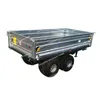When it comes to transporting goods, equipment, or recreational items, a reliable trailer is essential. Our trailers are engineered with precision, durability, and versatility in mind, making them the top choice for both personal and commercial use. Whether you're hauling heavy loads for construction, moving household items, or embarking on an outdoor adventure, our trailers offer unmatched performance and safety. In this detailed guide, we'll explore the key parameters, features, and frequently asked questions about our trailers to help you make an informed decision.
Our trailers come in various models, each designed to meet specific needs. Below is a comprehensive list of parameters that define our product line, ensuring you understand the capabilities and specifications.
To help you choose the right trailer for your needs, here's a table comparing our popular models based on key parameters.
| Model Name | Weight Capacity (lbs) | Deck Size (ft) | Axle Type | Brake System | Price Range (USD) |
|---|---|---|---|---|---|
| Utility Master 1500 | 1,500 | 5x8 | Single Axle | None | $1,200 - $1,500 |
| Heavy Hauler 5000 | 5,000 | 6x12 | Tandem Axle | Electric Brakes | $3,000 - $3,800 |
| Commercial Pro 10000 | 10,000 | 8.5x20 | Triple Axle | Surge Brakes | $6,500 - $8,000 |
| Adventure Series 3000 | 3,000 | 5x10 | Single Axle | None | $2,000 - $2,500 |
Here are some common questions and detailed answers to help you understand trailers better.
What is the maximum weight a trailer can tow?
The maximum towing capacity depends on the trailer model and your vehicle's towing capabilities. Our trailers range from 1,500 to 10,000 lbs, but always check your vehicle's manual and ensure proper hitch setup to avoid overloading.
Do I need a special license to operate a trailer?
In most regions, a standard driver's license is sufficient for trailers under a certain weight (e.g., 10,000 lbs in the US). However, for heavier trailers or commercial use, additional endorsements or a commercial driver's license (CDL) may be required. Always verify local regulations.
How do I maintain my trailer for longevity?
Regular maintenance includes checking tire pressure and tread, inspecting brakes and lights, lubricating bearings, and cleaning the trailer to prevent rust. Store it in a dry place and perform annual servicing to ensure optimal performance.
Can I customize my trailer with additional features?
Yes, we offer various customization options such as adding ramps, side rails, toolboxes, or upgraded tires. Contact our sales team to discuss your specific needs and get a quote for modifications.
What safety features should I look for in a trailer?
Key safety features include reliable braking systems (electric or surge brakes), DOT-compliant lighting, secure couplers, and proper weight distribution. Always use safety chains and perform pre-trip inspections to ensure safe towing.
How do I choose the right trailer size for my needs?
Consider the type and volume of items you'll be hauling. For small loads like ATVs or furniture, a 5x8 ft trailer may suffice. For larger equipment or vehicles, opt for a 6x12 ft or bigger model. Measure your items and consult our size guide for recommendations.
Are there any warranties available for trailers?
Yes, our trailers come with a standard warranty covering defects in materials and workmanship for 1-3 years, depending on the model. Extended warranties may be available for purchase. Review the warranty terms at the time of sale.
What is the difference between single and tandem axles?
Single axles are suitable for lighter loads and offer better maneuverability, while tandem axles (two axles) provide increased stability and weight capacity for heavier loads, reducing sway and improving safety.
How do I register and insure my trailer?
Registration requirements vary by state or country; typically, you'll need proof of ownership, a bill of sale, and to pay applicable fees. Insurance is often included in your auto policy but may require adding trailer coverage. Check with your insurance provider for details.
Can I use a trailer for off-road or rough terrain?
Some trailers are designed with off-road capabilities, featuring reinforced frames, all-terrain tires, and higher ground clearance. Specify your intended use when purchasing to ensure you get a model suited for rough conditions.


